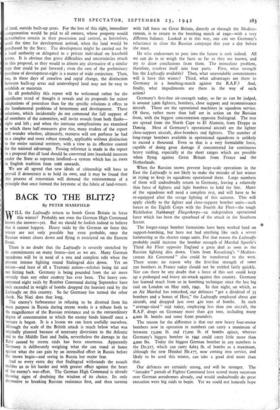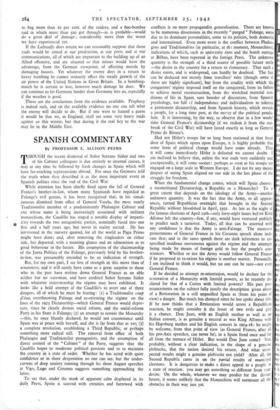BACK TO THE BLITZ?
By PETER MASEFIELD
WILL the Luftwaffe return to bomb Great Britain in force this winter? Probably not even the German High Command knows.the answeryet. But we should be foolish indeed to believe that it cannot happen. Heavy raids by the German air force this winter are not only possible but even probable, once the Russian winter closes down and flying is restricted on the Eastern Front.
There is no doubt that the Luftwaffe is severely stretched by Its commitments on many fronts—just as we are. Many German squadrons will be in need of a rest and complete refit when the present intense fighting round Stalingrad dies down. Yet no nation—and least of all a Teutonic nation—relishes being hit and not hitting back. Germany is being pounded from the air more severely than any other country has ever been. The heavy con- centrated night raids by Bomber Command during September have each exceeded in weight of bombs dropped the heaviest raid by the Luftwaffe on this country. So far Germany has turned the other cheek. No Nazi does that long.
The enemy's forbearance in refusing to be diverted from his main purpose in Russia during recent weeks is a tribute both to the magnificence of the Russian resistance and to the extraordinary degree of concentration to which the enemy binds himself once a venture is begun. It is a lesson we can learn usefully ourselves. Although the scale of the British attack is much below what was originally planned because of necessary diversions to the Atlantic and to the Middle East and India, nevertheless the damage in the Ruhr caused by recent raids has been enormous. Apparently Germany is deliberately weighing what she can stand at home against what she can gain by an intensified effort in Russia before the snows begin—and seeing in Russia her major fear.
And so every extra day that Stalingrad withstands the assault enables us to hit harder and with greater effect against the heart of the enemy's war-effort. The German High Command is already showing signs of doubting the wisdom of its choice. Its only alternative to breaking Ruisian resistance first, and then turning
with full force on Great Britain, directly or through the Mediter- ranean, is to return to the bombing match of 194o—with a very different balance. Looked at in this way, one can see Germany's reluctance to close the Russian campaign this year a day before she must.
He who endeavours to peer into the future is rash indeed. All we can do is to weigh the facts so far as they are known, and try to draw conclusions from them. The immediate problem,
therefore, resolves itself into four parts. First, what strength has the Luftwaffe available? Then, what unavoidable commitments will it have this winter? Third, what advantages are there to
Germany in a bombing-match against the R.A.F.? And, finally, what impediments are there in the way of such action?
Germany's first-line air-strength today, so far as can be judged, is around 5,90o fighters, bombers, close support and reconnaissance aircraft. Those are the operational machines in squadron service. Of these, rather more than half are in action on the Russian front, with the biggest concentration opposite Stalingrad. The rest are spread from the North Cape to El Alamein, from Dieppe to Danzig. Most of Germany's operational aircraft are the lighter close-support aircraft, dive-bombers and fighters. The number of long-range bombers available in operational squadrons is unlikely to exceed a thousand. Even so that is a very formidable force, capable of doing great damage if concentrated for continuous heavy raiding, especially at the short ranges which are possible when flying against Great Britain from France and the Netherlands.
When the Russian snows prevent large-scale operations in the East the Luftwaffe is not likely to make the mistake of last winter in trying to keep its squadrons operational there. Large numbers of them will undoubtedly return to Germany, leaving a relatively thin force of fighters and light bombers to hold the line. Many of the squadrons will need a complete rest, and will have to be re-equipped after the savage fighting of this autumn. This will apply chiefly to the fighter and close-support bomber units—such forces as the Eighth Corps with the Fourth Air Fleet—the tough Richthofen Nahkampf Fliegerkorps—an independent operational force which has been the spearhead of the attack in the Southern Sector.
The longer-range bomber formations have been worked hard on support-bombing, but have not had anything like such a severe hammering as the shorter range units. For that reason the Luftwaffe probably could increase the bomber strength of Marshal Sperrle's Third Air Fleet opposite England a great deal as soon as the Russian fighting dies down. Units from Kesselring's " Mediter- ranean Air Command " also could be transferred to the west. There seems no reason why the first-line strength of some zoo bombers in France today should not be trebled fairly quickly. Nor can there be any doubt that a force of this sort could keep up a prolonged and heavy air-attack against this country. Germany has learned much from us in bombing technique since the last big raid on London on May toth, 1941. In that night, on which, as an Air Marshal has remarked, our defences "got a dividend of 33 bombers and a bonus of Hess," the Luftwaffe employed about 400 aircraft, and dropped just over 42o tons of bombs. In each " average-sized " raid today, employing less than 200 aircraft, the R.A.F. drops on Germany more than 45o tons, including many 4P00 lb. bombs and some 8,000 pounders.
The reason for the difference is that our new heavy four-motor bombers now in operation in numbers can carry a maximum of between 13,000 lb. and 17,000 lb. of bombs apiece, whereas Germany's biggest bomber in 1941 could carry little more than 4,000 lbs. Today the biggest German bomber in any numbers is the Do.217, which can carry 6,615 lb. of bombs as a maximum, although the new Heinkel Hear, now coming into service, and likely to be used this winter, can take a good deal more than that.
Our defences are certainly strong, and will be stronger. The " intruder " patrols of Fighter Command have scored many successes over German aerodromes already, and would undoubtedly do great execution were big raids to begin. Yet we could not honestly hope to bag more than to per cent. of the raiders, and a boo-bomber raid in which more than Soo got through—as is probable—would do a great deal of damage ; considerably more than the worst we have experienced yet.
If the Luftwaffe does return we can reasonably suppose that these raids would be aimed at our production, at our ports and at our communications, all of which are important to the building up of an Allied offensive, and are situated so that misses would have the advantage, from the German viewpoint, of affecting morale by damaging houses. Yet whatever the enemy does in a return to heavy bombing he cannot seriously affect the steady growth of the air power of the United Nations in Great Britain. In a bombing- match he is certain to lose, however much damage he does. We can continue to hit Germany harder than Germany hits us, especially if the weather is good.
Those are the conclusions from the evidence available. Prophecy is indeed rash, and on the available evidence no one can tell what the enemy will decide to do. But if one were to hazard a guess it would be that we, in England, shall see some very heavy raids against us this winter, but that during it the real key to the war may lie in the Middle East.



























 Previous page
Previous page